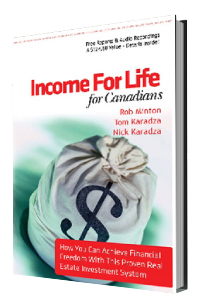Economics Help: Hands Off Real Estate Investing Within Your RRSP
Economics Help: RRSPs & REITs
Economics Help: Focus on RRSPs & REITs
When considering an investment in real estate, you may need some economics help - there are several avenues that can be used to accomplish your short and long-term goals.
Many people invest in residential or commercial real estate and have no problem handling characteristic landlord tasks, such as collecting rents, making improvements and repairs, as well as finding tenants to occupy the rental space.
However, there are many individuals that are not interested in assuming the day-to-day operations of real estate acquisitions and choose to purchase an equity stake in a real estate investment trust or a real estate mutual fund. Understanding the differences between both vehicles can present you with diverse opportunities. You can always use some economics help - continue learning as much as you can to increase your capabilities and understand where you're putting your money & what it is doing for you.
Real Estate Investment Trusts (REITs) Overview
In 1960, US Congress created a type of economics help - they were investment vehicles that allowed investors to come together and have ownership in real estate that could be located all around the world. These investments allowed individuals the ability to purchase a stake in a multimillion dollar, sometimes a billion- dollar, company in order to receive a steady income stream from its operations.
These type of investment vehicles spread internationally from there.
Characteristics of an REIT
The economics help potential for a steady income stream may allow shareholders to realize high returns on this type of investment, since a large percentage of the REIT’s taxable income each year is paid to its shareholders in the form of dividends.
Creation of an REIT
When an REIT is officially created, it is executed by a group of initial investors. Since the primary purpose of the REIT is to generate a healthy income stream, the REIT needs to actually purchase real estate.
These properties are purchased when enough capital has been raised from the REITs Initial Public Offering (IPO). The IPO is essentially the first time an investor is able to invest their money into a REIT at a set price. When a large amount of capital is accumulated, the REIT will begin to acquire assets.
However, not all REITs are publicly-traded entities which are listed on the stock exchange. There are REITs that are considered Non-Exchange Traded REITS, but are still registered with the Ontario Securities Commission (OSC). In addition, there are Private REITs that are not filed with the OSC, nor traded on the stock exchange.
Common Forms of REITs
The shareholders of an REIT are the owners of a pool of managed properties. It can also take on the form of owning mortgages that are secured by real estate, as well as a hybrid of the two combined.
The majority of REITs that are in existence today operate as Equity REITs. This involves the purchase of real estate that is operated by the economics help managers of the REIT, with income being derived from rents, as well as the potential profits from the sale of its properties.
On the other hand, mortgage REITs purchase mortgages or mortgage-backed securities that generate income from the interest income that they receive.
How You Can Participate in REITs
REITs can be purchased by an investor in their personal name or they can also be purchased inside of a retirement plan, such as a RRSP.
The Common Real Estate Purchases of REITs
Contrary to popular belief, not all types of real estate may be included in an REIT. Since the main purpose of the REIT is to make its investors (shareholders) money annually, real estate assets that do not provide an immediate income stream are not usually purchased.
Some common types of real estate that can be purchased for a particular REIT can be apartment complexes, malls/shopping centers, office complexes, storage business, and even hotels/resorts. There are also REITs that invest in industrial facilities, health care operations, and other mixed use investments that all involve real estate. So this might not be the exact type of economics help you prefer.
Advantages of Investing in REITs
Like any other form of economics help investment, there are risks and rewards with an REIT. One of the most important advantages to investing in REITS is the fact that often as much as 90 percent of the revenue that is generated inside the REIT is required to be paid out to each shareholder based on their percentage of ownership.
This is one of the most important strong points of REITs. There are many investment opportunities that only pay a fraction of their earnings to you each year.
Some of these economics help companies may not even pay out a dividend and will keep the cash on hand in the form of retained earnings. With an REIT, you may be able to receive the income stream that you are hoping for.
Another great advantage to consider when investing in a REIT is your ability to own multiple properties with a smaller amount of money. This means that you can have ownership in an apartment complex, a shopping center, and a hotel or resort without having to deal with the daily headaches. This is due to the fact that there are hundreds of investors that are pooling their money together to benefit from these well-performing assets.
Just as a regular purchase real estate purchase would focus on the long-term cash flow, an REIT is designed to provide its shareholders with these same cash flows.
You will be receiving income for the rents, as well as the potential appreciation of the property.
Disadvantages of Investing in REITs
Like any hands off investment approach one of the biggest downfalls is your lack of control. You are putting your money at the mercy of the REIT management team. This may or may not be a good thing but either way it is clearly something to be aware of.
Also, look carefully for any additional management fees that come of the distributions. Some REITs could have high fees that don’t justify their performance and do nothing more than strip profit from investors.
Details to Consider When Moving Forward With A REIT
If you were purchasing a piece of real estate to determine its feasibility, you would need to verify the integrity of that property. You will want to make sure that the electrical system is functional, the foundation is solid and the roof is in good condition. When looking at a particular REIT, some of the things that you should consider include the management of the REIT, the earnings history of the REIT and the diversification of its portfolio.
Management
When looking at the management of the REIT, the individuals that are operating the pool of assets should have a proven track record, or else the earnings that you want may not be realized. A management team that has a proven track record will undoubtedly provide the shareholders with great results. Be cautious of management teams that are not compensated based upon the REITs earnings, as those individuals are less likely to be motivated to provide the best possible services while running the REIT.
Earnings
You should also research the earnings of the REITs, since well-performing REITs will have a healthy history of earnings that were distributed to investors. One of the best indicators of these earnings is Funds From Operation (FFO). FFO is the income that the REIT's assets have generated throughout the fiscal year, without taking into consideration any gains or losses from the sale of assets and the adding back of the depreciation that was recorded for the assets.
Portfolio Diversification
When choosing a REIT you should also make sure that the portfolio of assets are well-balanced. Just like a stock portfolio, you may want to make sure that the REIT assets are not all concentrated in one sector of real estate. If that were the case, you may experience problems with the REIT, should that sector of the market take a turn for the worse.
By gathering this kind of information about a REIT, you can make an informed decision about whether or not you should invest any money.
These investments provide the average person with the opportunity to own real estate without having all of the necessary cash to purchase a property or the necessary skills to manage the asset properly. It can be a way to receive an income stream from real estate that is handled for you. Expect the returns to be much lower than investments you control and run yourself, but most of those would not be RRSP eligible.
Return from the Economics Help page to the Residential Real Estate buying guide by clicking here...
Some Cool Free Stuff...
Step 1:
|
Grab a free digital copy of our real estate investing book, Income For Life For Canadians, right here. This book has been downloaded over 22,597 times and has helped hundreds of investors kick-start their investing with simple and straight forward strategies that you can implement right here in Canada. |
 |
|
You'll also receive our weekly [Your Life. Your Terms.] email newsletter with the latest investing updates and videos. |
Step 2:
|
Free Weekly Investing Videos & Articles: Get the latest updates and join the over 10,000 other Canadians enjoying the weekly [Your Life. Your Terms.] email newsletter. The email is sent out each Thursday. And as a little bonus we'll give a FREE digital copy of the book, Income For Life For Canadians, too! |
Your Life. Your Terms.
Step 3:
|
Free LIVE Investing Class: Do you live in the Greater Toronto or Golden Horseshoe Area? Come out to our next introductory "Investing in Nice Homes in Nice Areas" Real Estate Class. |
 |
|
It's 90-minutes and you'll learn a ton - promise!Thousands of investors have now joined us for this class and the feedback has always been amazing. |



